#meet the sunset
Text


massimosimigliani
12K notes
·
View notes
Text
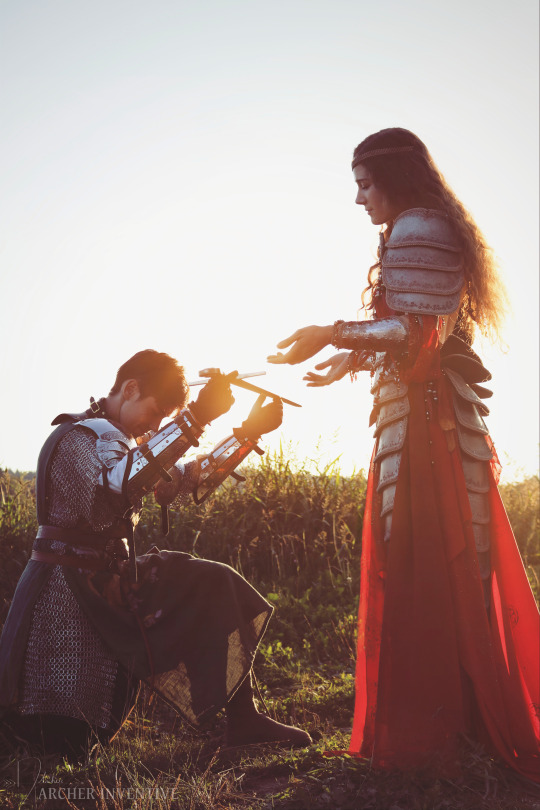
"And the mystery knight should defeat all challengers and name the wolf maid the queen of love and beauty" - George RR Martin
Some sword related content for your Saturday. :)
Thank you to Liv. FH for capturing this moment, and to @unicorn-shieldmaiden for always being such a lovely friend and model. ❤️
#lady knight#queen#the vow#oath#meet at sunset#armored dress#armor#knight#medieval#fantasy#photogaphy#archer inventive
1K notes
·
View notes
Text
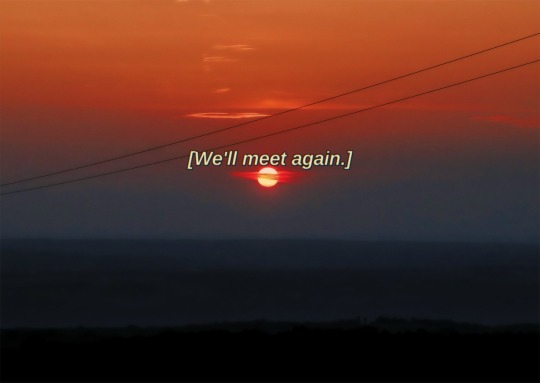
#meet again#sunset#longing#love#sky#thoughts#my photography#sun#my thoughts#falling in love#distance
303 notes
·
View notes
Text

Oh shit, an art kid. Throw crayons at em!
#matchart#meet the artist#i worked so hard on this#and by that I mean I didn’t#drives into the sunset
170 notes
·
View notes
Text
everyone always talks about the potential Ever After High and Monster High crossover (ignoring The Legend of Shadow High for obvious reasons) but nobody is ready to hear about the inherent genius that would be an Ever After High crossover with Equestria Girls.
main characters alone, Sunset Shimmer and Raven Queen would be the best team up.
#also not only are they similar#but sunset and raven are each best friends with pinkie and maddie#which are like also extremely similar#add in the fact that both their high schools are run by a pair of siblings#oh and imagine trixie and faybelle meeting#also the comedy of applejack and apple white meeting and applejack believing apple is a distant apple family relative#or a gag where rarity does her usual schtick of calling everybody ‘darling’ and then darling charming answers like ‘hm?’#and rarity is like ‘oh no darling not you i was talking to applejack’#please see the vision#eah#ever after high#mlp eqg#eqg#equestria girls#crossover#sunset shimmer#raven queen#pinkie pie#maddie hatter#i’m not tagging the rest. it’s not worth it.#ramble
91 notes
·
View notes
Text

Love is in the air, they said.
Fanart for Sunset ("Soleil") from "Eclipse Meets His Match" by @theinfamousdoctorf (mainly for Chapter 65).
(I allowed myself to add some lyrics. Just because this song was playing in my headphones while drawing, and I thought it was funny.
Feel free to ignore it)
"I just wanna dance alone,
I ain't ever goin' home,
I just wanna dance alone.
I just wanna dance alone,
I just wanna lose my phone
I just wanna dance alone"
Sia - Dance alone
#part of me feels sorry for him#but another part wants to bet how long he can last before he has a nervous breakdown#I give him three days#tw suggestive#<- i think i should add this tag#sams au#eclipse meets his match#emhm#Sunset#Soleil#Evil!Sun#other character#fan art#meme art#my art
67 notes
·
View notes
Text

#sunset glimpse#tyrone sunset#sunset#imiging#original photographers on tumblr#lensblr#meet me in the woods
208 notes
·
View notes
Text
Something something kh2 Sora's outfit being primarily dark colors despite being associated with light and Riku's outfit being primarily light colors despite being associated with darkness
#something something riku letting himself be eclipsed by darkness (taking on ansem sods form + black coat) to preserve soras light from afar#only to cast it off and return to light (true form + lighter colored outfit) once hes reunited with sora#ALSO something something riku using a blindfold to shield himself from the light (sora/his feelings for sora) to ensure he remains in the da#rk#ALSO soras red (sunset-dawn-light) to rikus blue/purple (midnight-dusk-dark)#but they still both have traces of yellow (sun-stars-moon-union of day and night)#the sun chasing the moon but never fully catches up until the moon aligns itself with it- a solar eclipse#a union that takes both parties meeting halfway to achieve- a chase that ends when the target wants it to- connection and love and wanting#im getting off track my point is FOILS!!!!! OPPOSITES!!!!!! SHOWING CONNECTION THROUGH ASSOCIATIONS#brb im going insane#sora#riku#soriku#kingdom hearts#kingdom hearts 2#kh#kh2#xander rambles
101 notes
·
View notes
Text

☀️ On every winter evening, the Sun shares a dance with the Snow ❄️
Here’s my piece for @fengqingzine! Finally in all its glory!! Thank you mods once again for this opportunity! Learnt a lot and had a lot of fun!! 💙💛
#fengqing#mu qing#feng xin#天官赐福#tgcf#fanart#art farts#tian guan ci fu#winter spirit mq#sun spirit fx#winter sun au#they can only meet when the sun touches the snow at sunset#make every moment count#☀️❄️#from dusk till dawn#fengqing zine
102 notes
·
View notes
Text
Damage Received
It's Astarion x Tiriel centered but there is something interesting for Alethaine's fans!
Synopsis: Tiriel was reckless and got severely wounded. Astarion is taking care of her.
Tags: protective Astarion, visions of the future
Thanks @themadlu for beta-reading!
Read on AO3
Masterlist
Headcanons

“Tiriel, watch out!” Astarion calls out for his beloved.
But she doesn’t hear him.
Her eyes glow with orange light, and her body is tense—there is nothing but primal rage in her mind right now.
She swings her two-handed ax and jumps on the enemy, a disgusting ankheg, an insectoid creature Astarion and Tiriel have been tasked to kill.
Tiriel yells but her blade barely scratches the chitin shell. Its claw knocks Tiriel on the ground and in a second the half-elf’s body is squeezed between the pliers.
Astarion hears the sound of broken bones and smells the scent of blood.
Tiriel’s blood.
“NO!” Astarion leaves his ambush. He doesn’t care if his armor is made of leather or if his daggers aren’t a match for the ankheg’s claws.
He won’t let it kill Tiriel.
The monster notices its other enemy, growls, and throws Tiriel away like a broken doll. The woman is smashed against a cave wall and falls on the dirty ground.
“Ig-nis!” fire appears on the tips of his fingers. A small fireball burns the creature’s face. It’s not enough to hurt it—but it’s enough to distract the insect and make it dig under the ground.
Astarion wastes no time and rushes to Tiriel.
Somehow she is still conscious. Her face is pale and her eyes are unfocused.
“Tiriel, we are leaving!” he grabs her hand but she doesn’t move.
“What? No…We can’t…” She can barely speak, her tongue is twisted.
“We go! Now!” Astarion knocks the ax out of her hands and grabs Tiriel’s waist. Thanks to his vampiric strength, he can easily carry her on his shoulder as if she were his captive.
The ground below them shudders and, before Astarion manages to jump on the cave wall, the ankheg breaks out of the ground.
Tiriel, still in a rage, grabs her ax, swings it, and…
The creature pierces her with his claw.
Blood gushes out of her throat. Her eyes stop glowing, and her ax falls to the ground. The insectoid tosses her lifeless body away but, instead of attacking Astarion, disappears under the ground.
It didn’t see him.
Astarion approaches Tiriel. She lies in the pool of her own blood, eyes wide open in shock and pain. Her stomach is turned into a disgusting red mash and her skin is white as if she was a vampire herself.
“Tiriel…” he whispers.
Her gaze is absolutely mindless, she whispers something with her smashed lips.
Astarion suppresses the desire to hug her, to press her against his chest. All the bones in her body are probably broken.
He is going to hurt her even more.
Gods…
He can’t lose her.
Not now, not ever.
“Tiriel… please… don’t… don’t leave me,” he kisses her cheek. “Please…”
Hours later, Astarion sits inside the tent and watches Tiriel. She is all heavily bandaged and he made her drink all the healing potions they were saving “just in case”.
What is worse, they are in the middle of nowhere—no clerics who could perform a ritual, no healers, not anyone.
They are all alone.
The scent of her blood makes him sick—it awakens something carnal in him and he has to suppress it.
“Tiriel,” he whispers, hoping she would respond to him.
If she makes it, he will never let her fight alone. He will never hide in the shadows, tricking the enemy into believing there is no second fighter.
if she…
Astarion should have ascended. To the hells with all those spawns, to the hells with the cycle of abuse. If he had ascended, Tiriel wouldn’t have lied there, wounded and dying. She would have lived a life of comfort with him like she deserved and she wouldn’t have suffered. hells, he could have made her a vampire - and���
He shakes his head.
What is he even thinking about? Tirel would have never forgiven him for ascending. She would have dumped him on the spot. And even he had managed to subdue her…
Tiriel would have never loved him. She would have preferred death to imprisonment in the castle.
It was the right choice back then. Tiriel was so sure he wasn’t a villain that he eventually believed in that, too. Astarion was always wondering how she managed to see his real self, buried and hidden. Where did she take that faith, that love, that… tenderness from?
Freedom and love come with a price.
if she is going to die, he can’t save her.
**
Tiriel is floating.
She can’t feel her body - but she is grateful for this numbness for she knows the alternative is pain.
The primal rage has already stepped back making Tiriel hollow. She remembers Astarion’s cry, his pleadings. “Please, be alive, please, make it!” he sounded so hurt, so miserable–she wanted to hug him and tell him everything would be alright.
Tiriel has never been a devotee—stuck between two worlds, she’s felt abandoned by both elven and human gods. People of the Sunset Mountains believe the souls feast with their ancestors. Elves believe their souls go to Arvandor for reincarnation. But what happens to half-elves?
Tiriel can’t go to reverie, her soul is new, it doesn’t have past reincarnations–and she will never have one. Will her ancestors welcome her in their savage paradise? Tiriel is sure they won’t. Besides, she doesn’t want to feast with them.
So what will happen to her?
Where will her soul go?
And Astarion… What will happen to him?
Tiriel suddenly realizes she is standing in a beautiful hall with a huge window.
An elven castle.
Tiriel doesn’t need to look closely to know who built this place and who lives there.
Elves.
A place of magical beauty–ancient and new at the same time.
Tiriel notices she isn’t alone.
An elven woman with waist-length and silver hair sits by the table with a red-haired girl on her lap. The woman’s dress is pitch black and her hair crowns a delicate tiara–Tiriel immediately knows she is a nobility, etriel, maybe even a queen if this place is a kingdom.
She holds her daughter gently but there is a menace coming from her. This elven lady knows dark secrets and she will rip anyone apart if anyone dares to threaten her little girl.
Tiriel’s heart aches. But who is she jealous of? Of the woman? Or of the girl?
“... Who was this tiefling?” the girl asks in Elven and her mother gently touches her ears.
“He is my friend. Theris.”
“You said you would stab him!”
“Hm, maybe friends is the wrong word,” the woman answers lazily. “We are… cousins.”
“But he is a tiefling! And you are an elf! Like me and Dad!”
Tiriel approaches them. The girl is adorable—like any elven child. It’s difficult to say how old she is, but Tiriel thinks she is about six. Her red hair is the color of fire and her pale skin is scattered with freckles. Her huge green eyes look at the world without fear.
As for her mother….
She could have been Astarion’s sister.
Silver hair. Pointy ears of the same perfect shape. The shape of her nose, the same pale skin. The eyes are different though, raven black, matching the dress.
She has three rings on her elegant fingers and none of them are elven—all blood red, more suitable for a vampire lady or a dark witch.
“I am a dhampir, Tiri,” the woman says and bares her fangs.” Do elves have fangs like that?”
Tiri giggles and touches her mother’s canines. The woman makes a playful movement as if trying to bite her which makes the girl laugh even louder.
“Let’s carry you to bed.”
“I had a dream today.”
“Oh, and what was that?”
“I was flying on a dragon across the Trackless Sea.”
“Well, maybe you saw your own future,” The woman kisses her daughter’s cheek and carries her away from the hall.
Tiriel wants to follow them but instead, she is mesmerized by the decorations of the castle. Elves do know beauty.
Soon she hears light footsteps. The elf is back. She stretches her arms like a lazy cat.
The first rays of the sun pierce through the window. The woman puts her face in the light and smiles.
Like Astarion would do when he was immune to the sun.
The elf opens her arms and takes a step forward.
And starts dancing.
She dances in complete silence almost making no sound with her bare feet. Her black dress resembles shadows over her pale body. There is something weird about her movements—they are elegant and vibrant and, at the same time, there is something off with them, as if she was a resurrected ghoul.
She is alive and undead at the same time.
Old and young.
A girl and a hag.
A witch and a queen.
Tiriel can’t take her eyes off her.
The dhampir keeps moving closer to the balcony. Tiriel follows her and now she finally can stop staring.
“I didn’t know you knew how to dance, Alethaine,'' a soft voice breaks the silence. A man with long blond hair and in green traveling clothes sits on a bench. His boots are covered with dirt and there are leaves in his hair.
A familiar, a lynx, lies under the bench.
“I have many talents, salen thiramin,” Alethaine answers in Common. “Though the last time I danced was two centuries ago. At the ball of those arrogant human nobles.”
“I thought you liked them.”
“It was nice enough to live up to my standards—but all these humans withered and died faster than I learned their names, Elren.”
Alethaine returns to the floor and sits near the bench. Elren intertwines his fingers in her hair.
Alethaine doesn’t move, allowing her thiramin to do whatever he wants.
“I am going to leave the isle for a few months. I have no fucking idea what Theris did and why he remembered my existence—but I am too curious not to learn”
“Hm, never knew your half-dead heart could show compassion towards other dhampirs,” he chuckles.
“Nonsense, Elren. We are like the grandchildren of that human king who made a hundred children within his pathetic human life, lived up to a century, and once he died his grandchildren started a war to get the throne. We don’t like each other, we miss the years when we thought we were the only ones and we both have a parent whose life was ruined by a pathetic cunt of a vampire lord.”
Elren takes Alethaine’s hand and kisses her fingers. It’s a weird mix of passion and chastity and Tiriel finally realizes she probably shouldn't be staring at someone else's private life.
“You are a much better person than you think, Alethaine.”
“Don’t be ridiculous, darling. I am a dhampir and a necromancer. It’s already a moral effort not to curse the sacred groves. Those druids are so obnoxious! I am the queen of this island and your wife and they refuse to let me in!” She laughs.
“Well, I think you would turn upside down any druid who would dare go to your dungeons. Besides, I thought you hated druidic magic.”
“Hm, I am three hundred and twenty years old. I am way past hating anyone. Well, except for anyone who prays to Lathander—I have personal issues with ‘the enemy of the undead’”.
Elren laughs and starts listing things his wife and queen has ever claimed to hate which forces her to offer sarcastic remarks to all of them.
“I’d like to add more points to your list. When I was ten, some unnamed asshole killed the kitten I wanted to foster and forced me to awaken my necromantic abilities. When I was fourteen, a bandit attacked me in the hills and my brain temporarily shut down, for I dined on his blood like a vampire. And let’s not forget the fucking blood witch whose eye I took with my father’s Sussur dagger”
The image blurs and the voices echo as if from a distance.
Suddenly, Alethaine turns her head and stares at the half-elf as if she could see her.
There is longing in her eyes. Sadness. Long-dried tears.
“I wish she were here,” Alethaine says.
“Who?” Elren replies.
“My mother.”
Tiriel wakes up.
She is in a dark room under a thick blanket. All her body hurts, and she can barely move.
And there is a familiar coldness close by.
“As-tarion”
The voice is so weak he barely hears it.
“Water.”
Tiriel’s eyes are wide open. “P-please.”
Astarion snatches a bottle, lifts Tiriel’s head up, and pours a little bit of water into her mouth.
“Tiriel… gods…” Astarion mutters.
“Don’t—don’t cry,” she whispers.
He collapses back near the bed. Tiriel makes an effort to sit up and sees she is wearing a very thin tunic, almost transparent.
Astarion is silent and then he looks at her and she sees anger.
“Tiriel, I will outlive you. I will witness your death regardless. Why do you insist on accelerating the natural process?”
“I am more than fine in battle,” Tiriel gets stubborn.
Asatrion jumps on his feet
“You are not! Look what this monster did to you!”
“I am fine!”
“Yes! Thanks to my skills I opened up a chest deep down the cave and there were healing potions! What if I hadn't found them? What if… “ his shoulders shudder and he sniffs.
Triel feels a knot in her stomach.
She was reckless. She didn’t think about anything except for her rage, just like she did all her life.
But the thing is…
She isn’t alone anymore.
Love is a new concept for her. Family, care—she has never had it. No one cared for her, a strong and fierce barbarian woman. And she never cared for anyone. if she bled—she bled alone. And if she was about to die, it was only her business.
But not anymore.
Tiriel makes an effort to sit up but the moment she does it a sharp pain pierces her body and she whimpers quietly.
Astarion immediately returns to her side. “Don’t move.”
He puts his head on her chest and Tiriel caresses his hair.
“I love you,” she whispers. “I am sorry I scared you. I am so sorry.”
He nuzzles into her collarbone. “I can’t lose you, Tiriel,” he confesses. “I can’t lose you. Not now.”
“And you won’t,” She kisses his bite mark and then puts her palm in the center of his back scars. Before, those parts of his body used to be forbidden for her touch, but, as time progressed, Astarion began wanting her to touch him there.
“I had a weird dream,” Tiriel whispers. “There was a woman… an elf…and she was dancing...” Tiriel suddenly realizes she doesn’t remember much. Only a blurry vision.
The witch-queen of Evermeet.
Tirlel lets her mind wander, not making any unnecessary movement or sound—she wants to allow Astarion to concentrate on her even breath and heartbeat. To be here for him. One day she will die. One day she will leave the material plane.
She doesn’t need to hurry.
**
Astarion finally relaxes. She is alive. She made it. Of course, she did! This impossible woman can withstand so many things—he shouldn’t have worried in the first place.
Right now he is in her arms, stealing her body heat and listening to the best sound in the world—Tiriel’s heartbeat.
All these long days he was caring for her. Doing all the work as if he were a healer.
He pulls on a thick blanket and bundles himself up. The air around him immediately becomes hot and Astarion feels himself like a kitten in its mother’s paws.
Astarion buries his nose in Tiriel’s chest—he doesn't need to breathe so he can just enjoy the warmth.
Terrible memories still haunt him even though five years were more than enough to collect good ones. But it's still a lottery if it is going to be one more nightmare when he needs to rest.
It’s neither.
He is in the cozy tavern, warm and dark. It’s a blizzard behind its walls. Even Astarion, who usually doesn’t care about the cold, wouldn’t dare to go outside.
There is only one person inside except for the innkeeper.
An elf sits at the table engrossed in a book. She wears black traveling clothes, her silver hair flowing along her back.
Sometimes, Astarion remembers, elves see glimpses of the future, something that’s already been decided but has not happened yet. It’s the first time for Astarion and he concentrates on this new experience.
The elven woman in front of him tries to look menacing but Astarion immediately notices she is rather young, maybe only seventy-year-old. The book she reads is just some tooth-rotting romance young elves love so much. The drink in her mug is something really sweet.
Suddenly the door swings open, letting in the frosty air. The elf gives the stranger a scornful glance and goes back to reading.
“Alethaine!” the stranger, a young human in her fifties bellows. “What the fuck are you doing here?! We told you to get out.”
“I am sorry, are you talking to me?”Alethaine asks.
“I don’t see any other dhampirs around here!”
Alethaine points at the mirror. “Since when do creatures like me and you don’t have reflections?”
The woman bares her fangs. “Don’t make me angry, necromancer. I told you to get out”
The elf shrugs. “Hm, don’t recall. You were yelling a lot of profanities and I stopped listening once you got repetitive. I think you should meet my father. He can teach you how to use verbal insults. Oh, I am sorry, I forgot. You have issues with vampire fathers. Unlike me.”
“ENOUGH!” The human dhampir stands up and raises her hand up to the ceiling. Astarion sees how the blood on her fingertips starts swirling resembling thin ribbons.
Blood magic.
Astarion is afraid, although it’s not real. Blood magic is deadly, unnatural even for vampires.
Alethaine flips the page.
“I DEMAND A DUEL!”
“For fuck’s sake,” Alethaine says. “Do you really have nothing to do except for hunting me in the mountains?” She stands up and Astarion is ready to see a ray of necrotic damage bursting out of her hands.
Instead, Alethaine snatches a dagger from her belt and throws it at the witch right in her eye.
The witch screams as blood floods her face. Alethaine approaches her and pulls the blade out of her empty socket.
“My eye! Elven bitch!”
“Now listen to me carefully,” Alethaine kneels in front of her wiping the dagger. "My father taught me to stab first and not to ask stupid questions like 'Who goes there’, ‘What do you want’, ‘Why do you hate me”. I don’t fucking care what your coven is up to. I don’t want your secrets, your cult, your gold. I just want you to leave me alone. And if you,” Alethaine returns to the table, “stand in my way once again, I will take your second eye.”
As if nothing happened, Alethaine sits back and picks up the book. The blood witch disappears in the blizzard.
Astarion tries to take a better look at Alethaine, but the vision gets blurry, disappearing in the fog of time.
Unlike Tiriel who remembers the vision of a dancing “witch-queen”, Astarion’s dream fades away the moment he opens his eyes.
But the name is engraved in his mind to be put to use years later.
When Astarion holds his newborn daughter for the first time.
--
Alethaine refers to the events taken place in The Dead, the Half-Dead and the Undead and The Monster
--
--
Tag list
@tugoslovenka @marcynomercy @wintersire @vixstarria @not-so-lost-after-alll @ashiro20 @theearthsfinalconfession @herstxrgirl @starlight-ipomoea @micropoe10 @astarion-imagine-archive @veillsar @elora-the-slutty-songstress @fayeriess @lumienyx @tallymonster @caitlincat-95 @tragedybunny @valeprati @lynnlovesthestars @marina-and-the-memes @waking-electric @ayselluna @connorsui @asterordinary @darkarchangel96 @locallegume @brainfullofhotsauce @coffeeanddonutscafe @my-queen-rhaenyra-targaryen @queenofthespacesquids @ednaaa-04 @dajeong
#astarion#baldur's gate 3#bg3 astarion#bg3#astarion romance#astarion bg3#baldurs gate 3#astarion x tav#alethaine ancunin#astarion being a dad#dadstarion#astarion fluff#spacebarbarian fics#astarion ancunin#astarion baldurs gate#astarion brainrot#astarion fanfic#tiriel of the sunset mountains#tiriel the barbarian#astarion x tiriel#oc tav: tiriel#dhampirs of the sword's coast#astarion hurt#meet the dhampirs#astarion's daughter#astarion's daughter alethaine#baldur's gate
64 notes
·
View notes
Text
I thought Kim's portrait looking a little like the Rising Moon Hanafuda card was just a neat coincidence but I actually like the idea of Kim symbolising a moonrise instead of a sunrise. the Sun is the brightest star in the sky and when it's gone the Moon keeps reflecting its light. what if (if you play him as a huge communard) Harry dies just like Mazov and Kim becomes the "echo maker", the one who spreads his message
#I'm just saying words and blathering because I'm waiting for something and I need to distract myself#I like putting ideas out I don't know if they make sense#in the hanafuda card the moon is rising at sunset 🎴. they meet for a moment#disco elysium#pointless microblogging#if moralism is the blue sky communism is the night sky no?#disco elysium spoilers#sort of#let kim fix the fucking tiptop analysis he needs to do it#even if it's right because he might love machines but you can't deny he craves violence in some complex way#he needs to sit down and write his thoughts on the subject so he can think about it
109 notes
·
View notes
Text

'Don't Leave Me This Way'
#sunset#tyrone sunset#meet me in the woods#imiging#original photography on tumblr#lensblr#don't leave me this way
48 notes
·
View notes
Text
Pain, Trust, and Separation in Some Asian Dramas (The Second Post In a Series of Utterly Un-scholastic, Highly Personal Big Meta)......
AKA, Turtles Catches Up With Old GMMTV: The Bad Buddy Rewatch Edition, Part 2 -- How Themes of Pain, Trust, and Separation Create Structure and Narrative in Bad Buddy and Other Asian BLs
[The following is a preamble I use for my Old GMMTV Challenge posts, here we go! What’s going on here? After joining Tumblr and discovering Thai BLs through KinnPorsche in 2022, I began watching GMMTV’s new offerings -- and realized that I had a lot of history to catch up on, to appreciate the more recent works that I was delving into. From tropes to BL frameworks, what we’re watching now hails from somewhere, and I’m learning about Thai BL's history through what I’m calling the Old GMMTV Challenge (OGMMTVC). Starting with recommendations from @absolutebl on their post regarding how GMMTV is correcting for its mistakes with its shows today, I’ve made an expansive list to get me through a condensed history of essential/classic/significant Thai BLs produced by GMMTV and many other BL studios. My watchlist, pasted below, lists what I’ve watched and what’s upcoming, along with the reviews I’ve written so far.Today, I offer the second of four posts on Bad Buddy, and the second in a Big Meta series on pain in some Asian dramas, including QLs and/or het romances. I'll look today at how ideas of pain in love, trust in love, and separation of partners/family members creates narrative drive in Bad Buddy and other Asian BLs. THIS IS A LONG POST, caveat emptor.]
Links to the BBS OGMMTVC Meta Series are here: part 1, part 2, part 3a, part 3b, and part 4
Well, after a lot of titles and a chewy preamble (thank you for getting through that, y'all!), I'm here to say that I'm combining my two ongoing meta series into one big ol' post here that I've been dying to write for months. In the course of my watching the shows on the Thailand-based Old GMMTV Challenge watchlist, as well as watching shows from my BL gateway of Japan, I've noticed that the themes of pain and trust in love, along with voluntary or involuntary separation, have been used to create dramatic and narrative structure within Asian dramatic stories to many emotional effects.
I'm celebrating the incredible Thai BL drama that is Bad Buddy in my OGMMTVC series at the moment, and within my Big Meta series on pain in Asian dramas, I examine how themes of pain so very often harken back to artistic, and even traditional, viewpoints of how pain, suffering, and melancholy are natural cultural assumptions within many collectivist Asian societies. In my first Big Meta on pain and suffering in Asian dramas, I wrote that "accepting pain and suffering is a part of the life we decide to live, from an Asian cultural perspective." Suffering is a naturally assumed part of life, a very distinct and identified part of a Buddhist's lived life, and even outside of Buddhism, accepting and living with difficulties of all kinds -- wealth disparities, the struggle for a good education and/or a successful career, the struggle to conform to collectivist familial and/or social expectations, etc. -- are extremely common themes that are unwound on in Asian lives on a minute-to-minute basis. The idea that an Asian must live with pain is often a root of intergenerational trauma, passed along from generation to generation of Asian children-to-adults. The social mores by which Asians are raised and live, to assume what Westerners might call a lack of unconditional parental love and affection, are certainly in part rooted in an assumption that living with pain and without the, say, luxury of turning over one's emotions at any given moment, are an automatic given.
As I've plodded through the OGMMTVC watchlist, I noticed very often that separation of people -- whether those people are lovers, children/parents, or simply just adults within a group -- is often a major narrative turning point in the course of a dramatized relationship. Of course it would be; it's a common trope within the romance genre, for instance.
But I find the separation of people otherwise connected to each other -- and the assumed pain of that separation, and the trust that people may have to return to each other -- particularly fascinating within the realm of Asian dramas, for reasons relating to the assumption of pain and suffering in one's life within Asian cultures that I mentioned above. In other words, the pain of separation, and the trust that one might have that one person will come back to another person -- are givens within the scope of Asian life.
In the following dramas, I note that separation is either a central storytelling point, or is a central focus of side characters:
1) The Thai filmmaker, Aof Noppharnach, has explored separation of people/lovers in many of his shows, including Still 2gether, A Tale of Thousand Stars (in multiple forms), and in Bad Buddy (also in multiple forms, romantic and/or familial).
2) Also from Thailand, Until We Meet Again and I Promised You The Moon are two non-GMMTV dramas in which separation of lovers plays an important concluding narrative role.
3) From Japan, the movie version of Cherry Magic: 30 Years of Virginity Can Make You a Wizard?! captures an important central narrative of separation that leads the franchise's two protagonists, Adachi and Kurosawa, to explore depth in honesty and intimacy that they may not have otherwise achieved in their everyday lives.
The painful separation that occurs in Aof Noppharnach's shows is most often related to the outside forces of life as it needs to be lived -- very often economically -- within or external to Thailand. In Bad Buddy, Pran leaves for Singapore for two years. I'm going to unwind much more on Pran leaving for Singapore in the final installment of my Bad Buddy OGMMTVC meta series, particularly by way of how he can do it, emotionally. But I want to offer a quick note about Pran's departure that the show gives a hint to (despite the pain that we feel in our hearts for Pat's loneliness from Pran, as depicted so beautifully by Ohm Pawat and his silent and longing existence as Pat in the first half of the Bad Buddy series finale). The BBS finale has Pran stating that he'll only be away for two years, and that the pay and the opportunity for an excellent architecture job were better in Singapore. In conversation with the fabulous Thai blogger, @recentadultburnout, RAB mentioned that this is a common occurrence among young Thais -- to move overseas for better job opportunities.
In spite of my heart breaking a bit for Pran being away from Pat when I first learned about his leaving for Singapore -- when RAB put Pran's departure in that context, I had to slap my cheek a bit. Because! I'm a child of Asian immigrants. Separation from family for better economic opportunities is a HUGE part of our paradigm of life between continents. As my Asia-based uncle, my mother's brother, once put it, in regards to my mother: "one of the children in our families always had to move away." For my mother's family, it was my mom who shipped off. Besides individuals seeking better economic opportunities for themselves, the economies of many Asian countries are dependent on the reception of remittances from overseas family members sending money back to their home countries, as my mom did for years; the Philippines is particularly notable for having a nearly 9% contribution from overseas remittances to its gross domestic product. In other words? The separation of loved ones is literally built into the financial frameworks of many Asian nations.
The separation of children or partners to overseas locales for the sake of better salaries and/or opportunities is simply a more assumed part of the cultural paradigm, I'd argue, in Asia than in the West. Family separations for jobs are extremely common in Asia; in the West, I'm not sure they are as assumed, especially for extensive separations, as the value placed on keeping a family unit together for cultural or spiritual reasons seems to be more a part of the Western fabric of life (despite our high rate of divorce).
We see an even more permanent economic separation happen in Still 2gether between two side characters -- Type, played by Toptap Jirakit, who is Tine's (Win Metawin) brother, and Man (Mike Chinnarat), who is Sarawat's (Bright Vachiwarit) friend. Man chased after Type during the first 2gether season; in Still 2gether, they're navigating their committed relationship, as Type contemplates, then accepts, a permanent job offer in Phuket, hours away from their home base in Bangkok.
As @lurkingshan put it, I might be the only person on the planet contemplating Type's and Man's relationship (lmao, it do be true), but I found Type's last conversation with Man, on the beach, to be particularly direct and moving for someone who has no immediate plans to move back to the side of the person he's dating.
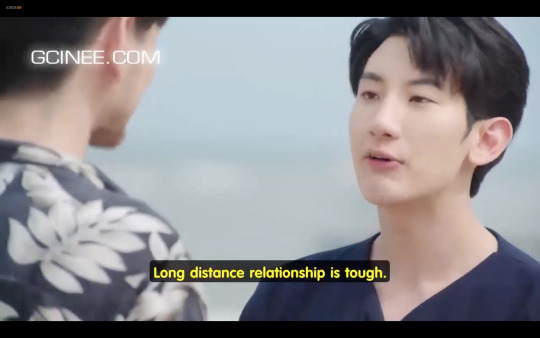
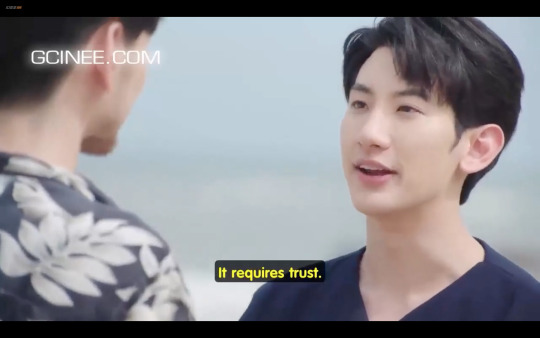
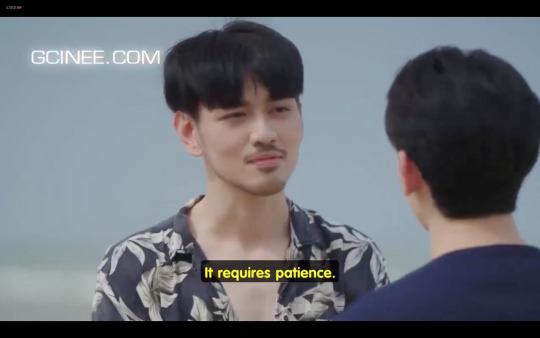
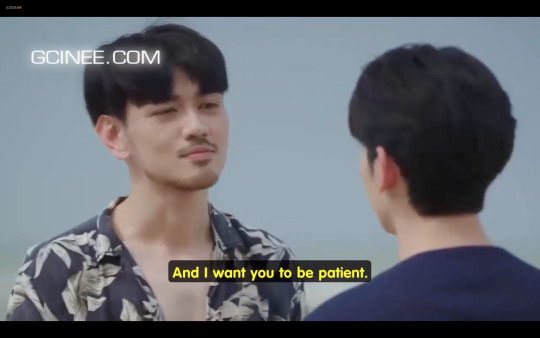

I think about this scene against the structure of the short series that is Still 2gether, which is centered around the protagonists of Sarawat and Tine being temporarily separated as they prepare to compete in a university-wide tournament. Sarawat has the most lovely contemplation on love during this separation, and even Aof Noppharnach himself admits that the glance that Sarawat and Tine give to each other as they pass each other in the lead-up to the ultimate tournament is his favorite scene he's ever filmed (!!!) (and that scene is sooooo reminiscent of Pran's and Pat's pinky-hold after their public "break-up").
In other words: Still 2gether is ALL about separation, and contemplating the strength of love relationships in the face of those separations. While Sarawat and Tine will get back together, after that tournament -- Type and Man are separated for the foreseeable future. There is no end indicated to the patience that Type wants from Man. The conversation is just, THERE, and hanging -- there's an acknowledgment that long-distance relationships are tough, but Type isn't offering to quit his job and move back to Bangkok. Instead, Type and Man are left to accept the reality that there is no end in sight to their separation.
And I think this was incredibly bold of Aof Noppharnach to include in a GMMTV BL that otherwise ended happily for Tine and Sarawat, the main protagonists. What I admire about Aof's works are these sly inclusions of open-ended, sometimes melancholy non-resolutions, either for his main or his support characters, that leave us as viewers often slightly unsatisfied or unfulfilled. He did this in particular with the character of Aof in Gay OK Bangkok, a web series that he screenwrote in 2016; and many might say that Pran being away in Singapore is also not the most satisfying of endings for our beloved PatPran in Bad Buddy. To me, these decisions to do this artistically are just incredibly reminiscent, again, of the kind of pain that we as Asians have been culturally attuned to accept, for the sake of economics, and/or for the sake of the betterment of our loved ones.
Besides economic separations in Aof Noppharnach's works, we also have separations related to family demands and desires. In A Tale of Thousand Stars and Our Skyy 2 x A Tale of Thousand Stars, we see Tian leaving Phupha's side for two years to study for a graduate degree at Tian's mom's insistence; and we see Phupha refusing to join Tian, after Tian has graduated and moved back to Pha Pun Dao, on trips Tian takes back to Bangkok to celebrate his birthday with his parents.
When I rewatched ATOTS earlier this year, I noted that both Phupha and Tian were remarkably bad communicators throughout the original series -- and I posited that, in large part, their terrible communication was borne out by way of the both of them being raised in traditionally masculine Asian households that seemed to not allow for leeway regarding emotional revelations. BOTH Phupha and Tian were expected and intended to follow in the footsteps and demands of their family members. To the end of the ATOTS storyline in Our Skyy 2, Phupha brings up his parents -- and he hears what he has been wanting to confirm from Tian's parents, in their desire to have Phupha take care of Tian for the rest of their lives.
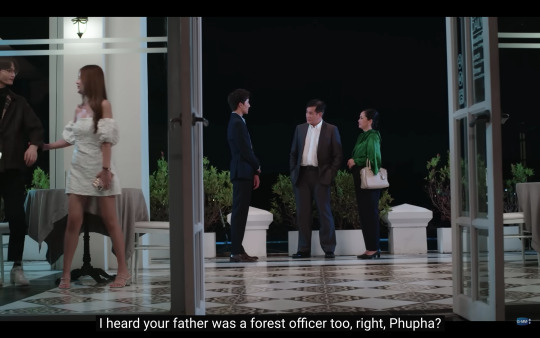

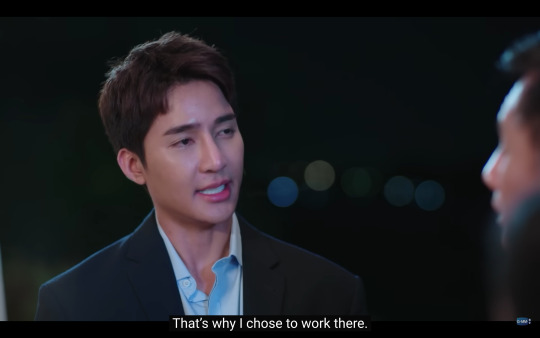
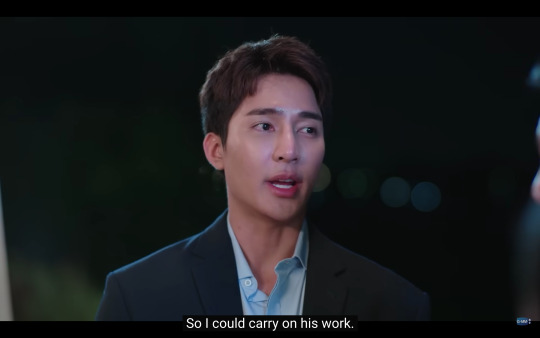
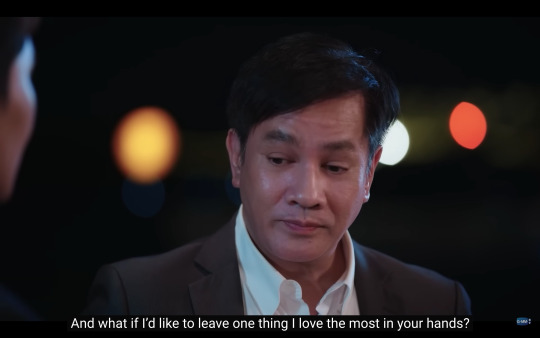
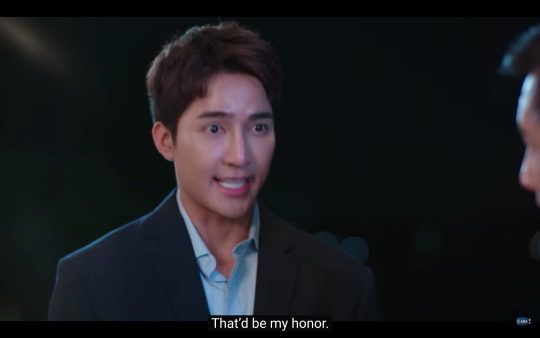
Phupha in particular needed to have multiple gateways opened to him, vis à vis Tian's family, in order to properly and openly confirm his permanent love and commitment to Tian. If Phupha didn't have that? He was willing to be separated from Tian, either temporarily, or at length. Phupha needed a kind of culturally accepting door opened to him -- as a man raised in what we assume to be a rural and traditional environment that may very well have not allowed for a gay man to live openly and honestly. Phupha indeed follows in his father's footsteps, to the extent of never leaving Pha Pun Dao, and demanded that he have Tian's family's approval before making the final commitment to Tian to love Tian forever.
I find the cultural nuances of nuclear family separation, or separation encouraged by nuclear family, to be particularly heartbreaking in many of Aof Noppharnach's works. We know that Jim and Jam, brother and sister in Moonlight Chicken, ran away from their Isan hometown as youths to find their lives in Pattaya, where we meet them in the context of that show. But separation either from nuclear family, or more impactfully, done by nuclear family, is most evident in Bad Buddy.
Besides Pran voluntarily leaving for Singapore, we know that Pran has been involuntarily separated from Pat before -- when Pran was transferred to a boarding school in 10th grade by his mother, Dissaya. Before that transfer, Pran and Pat were technically "separated" by their parents in so far as they were not supposed to become friends -- all while competing heavily against each other in every category of life.
That boarding school transfer? That wasn't just separating Pran from Pat. What I found remarkable about that separation during my recent BBS rewatches is that Dissaya HERSELF chose to be physically separated from her own son, for the sake of her rivalry with Pat's father, Ming.
I'm thinking about this particularly from the words she used with Pran as they sat at breakfast together before Pran started his second year at university, when Dissaya said that Pran could date anyone, men or women, as long as he "didn't date [the next door kid]."
My interpretation of that perspective is that Dissaya did not want Pran to relieve the heartbreak that she herself experienced when she was close with Ming in her teenage years.
In other words: she chose to send her son away in the face of her ongoing, lifelong fear that Ming and his family would once again wreak havoc on her and her clan.
In the continuation of the intergenerational trauma wrought upon Pat and Pran by their parents -- as a mother myself, this seems to be particularly egregious. Dissaya would have rather had her son AWAY FROM HER, than to contemplate her son even being WITHIN physical proximity to Pat in the context of her hatred of Pat's father, Ming, and the fear that she had that the Jindapats would negatively influence the Siridechawats again.
(The wonderful @telomeke reminded me, in conversation on this topic, that the first question Dissaya asks Pran, after learning about the first faculty fight in episode 1 when Pran re-encounters Pat for the very first time, was, "Did he hurt you, Pran?" Dissaya cannot bear to allow the Jindapats to hurt her son, or her family, ever again.)
I wrote in my first Big Meta on pain and suffering that Asian parenting expectations and mores are far more conditional than they are in the West, as parenting mores in the West are centered around unquestioned and unconditional love from parents to children. So much of Bad Buddy meta out there focuses on the internal experiences of Pran and Pat. When I sat back to think about Dissaya making the decision for herself to be separated from her son for years -- and then to also contemplate pulling Pran FROM COLLEGE when she learns that Pat goes to Pran's university -- I mean. We know Dissaya and Ming both tried their best to embody their hatred of each other into their children. But Dissaya takes it a couple steps further, by attempting to literally control Pran's physical existence vis à vis Pat, which -- and I'm going to sound like a judgmental Westerner here, even as an Asian -- strikes me as out of line by way of just pure emotional projection onto one's children.
When Pran goes to Singapore, at the end of the series, it's out of his own volition. Again, I'll write more about this at the end of my BBS OGMMTVC meta series. But what he experienced by ways of many TYPES of separation from Pat throughout his life -- competitively, emotionally, and then physically -- are extensive. He was physically separated from Pat by Dissaya. He was theoretically "separated" from Pat emotionally, by being discouraged in having a friendship with Pat. He is physically separated from Pat *again* when he goes to Singapore. And I posit later in this piece that Pat and Pran had another theoretical "separation" when they are pretending to be broken up throughout the course of their relationship.
When I think about what teenage Pran must have felt to be *physically sent away* -- BY and FROM his own family, for their sake of his family's desires to avoid ANOTHER family -- it explains a hell of a lot more about Pran's tendency to dissociate, particularly during stressful times. (We see this when he's alone at the demolished bus stop, and cutely in Our Skyy 2, as Pat encourages a grumpy Pran to go to Pha Pun Dao.)
And where Pat balanced Pran out -- where Pat could offer the kind of companionship, and relaxed and equitable communication that Pran had never had with his family -- was where Pran could finally experience truly open and SAFE love from and with another person, another person who wouldn't *send him away* if Pran didn't play by their rules. Instead, Pat fought by Pran's side, and Pran was willing to fight, too, and they remained together, and safe in their love and trust.
Whew. Dissaya separating Pran from his own family, from herself -- to leave him alone at boarding school -- seriously punches me in the gut, especially as a mother myself. I'm thinking about a teenager, on the cusp of adulthood, alone to contemplate his unending love for Pat, and I'm like.... I wouldn't leave a kid alone like that for a moment. But for Dissaya, her husband, and their pride? It seemed to be a worthwhile decision in that moment. A decision that we know would blow up in their faces in episode 10 of Bad Buddy.
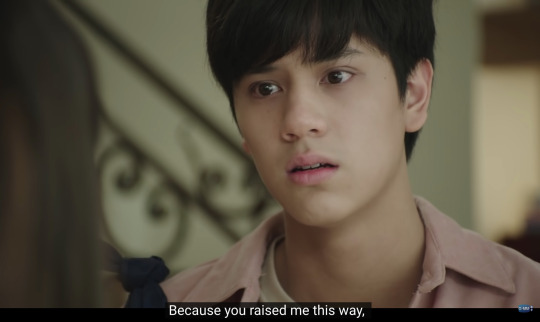
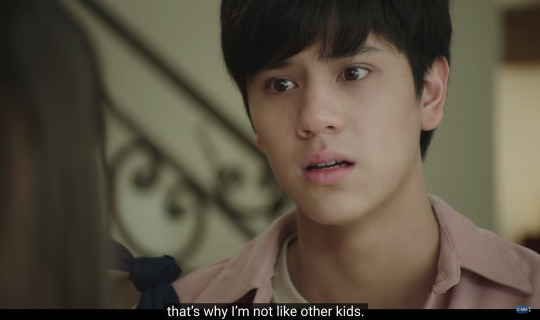
In Pran's first separation from Pat -- Pran did not have personal agency. He did have agency later on, as he moved to Singapore, which again, I'll contemplate in a further meta.
Two instances where I was impressed by protagonists leveraging their agency vis à vis temporary separations from their partners was in Until We Meet Again and in I Promised You The Moon.
UWMA's Pharm was first and foremost presented as a blushing maiden. HOWEVER: Pharm demonstrated quite a bit of sexual agency early in the series. He was forward in his crush on Dean. He contemplated openly being gay. And he wasn't afraid to push Dean away when Dean was moving too fast sexually.
At the end of the series, after Dean and Pharm have resolved their spiritual connection vis à vis the embodied spirits of Korn and Intouch meeting once more -- Pharm wants to know if the love between him and Dean is real, and independent of the influence of the spirits of Korn and Intouch. So: Pharm asks for a break.
Throughout UWMA, Dean is the obvious seme, and Pharm is the blushing uke. I squealed in DELIGHT when I first watched Pharm asking for the break. Yes, Pharm loved Dean -- and what I saw in Pharm's asking for a temporary separation was truly out of that love, to confirm between the both of them that their relationship was very much indeed a forever relationship. God, I get chills thinking about it: Pharm was safe enough in his sphere with Dean to ask for and to GET the agency-driven space that HE NEEDED to feel fully confident in the relationship. That was a risky move that paid off for the two guys in dividends in the end. Dean had no choice but to say yes there.
The fabulous Oh-aew in I Promised You The Moon goes even further than Pharm. He fucking breaks up with Teh! After Teh cheated on Oh-aew! YES, HOMEY, YES! No wibbling on Oh-aew's end. Oh-aew was devastated, yes. But he knew he had to have Teh out of his life in that moment, for the sake of Oh-aew's own happiness, growth, and development. He even rejects Teh's reach-out at the end of their college careers.
What stuck me as so golden about the ending of IPYTM was that that break-up wasn't actually presented as temporary. They were apart for OVER A YEAR (thank you kindly to @shortpplfedup for the temporal fact-check!). Oh-aew held his ground. He needed his time and space. He needed to grow! And he valued that, individually.
I'm celebrating these two instances of agency-driven separations because of the style of their intention vis à vis the protagonists asking for, needing, and leveraging these separations. With the economic and involuntary separations I talked about earlier -- it's like there was a higher need, whether it was for money, a better career opportunity, fear, or selfishness on the part of a family to create the separation.
With Pharm and Oh-aew: the separations they demanded were purely personal and for their own growth. We know now that Pharm and Oh-aew get their endings with their partners. Pharm has a purely happy ending with Dean in Between Us. Oh-aew's ending with Teh is open-ended -- we don't know what chaos Teh will wreak next -- but at least we know they're navigating that chaos together again.
The last drama I wanted to take a look at regarding pain, trust, and separation is the fabulous movie continuation of Cherry Magic: 30 Years of Virginity Will Make You a Wizard?! (I always love writing ?! whenever I talk about Cherry Magic, lol).
The central separation in the movie of the two protagonists, Adachi and Kurosawa, comes about when Adachi is transferred to Nagasaki for work. As @neuroticbookworm and @lurkingshan can attest to: a Western viewer of Japanese BLs will often find themselves screaming to a screen, "JUST TALK ALREADY!," and a uniquely common aspect of Japanese doramas is that so much of communication in Japanese culture is silent, unsaid, kept internal by collectivist social pressures to not make waves with another person -- which automatically creates ongoing questions of trust between partners. When Adachi (Akaso Eiji) shares with Kurosawa (Machida Keita) that Adachi will be moving, Kurosawa shares in words that he's happy for Adachi, but through very simple body language, communicates that he is feeling otherwise.
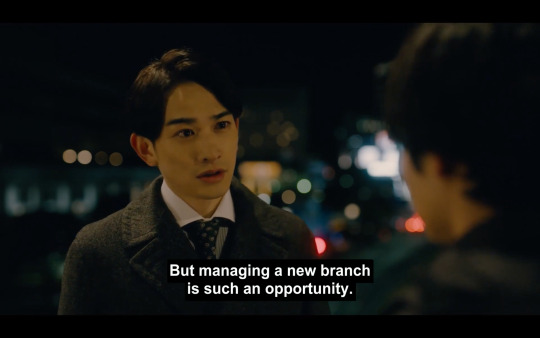
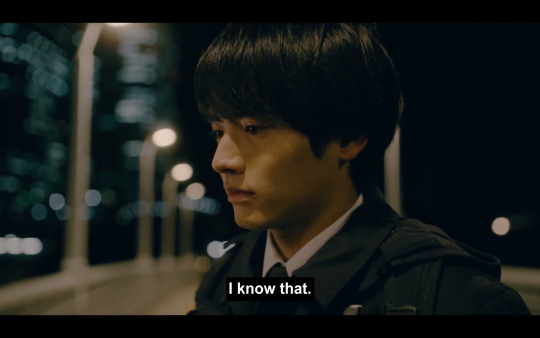
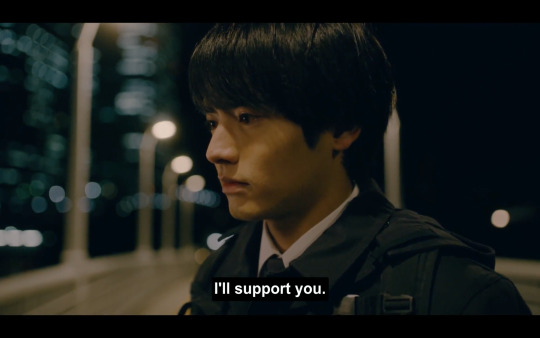
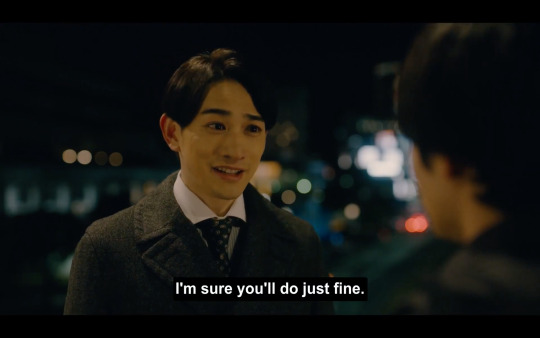
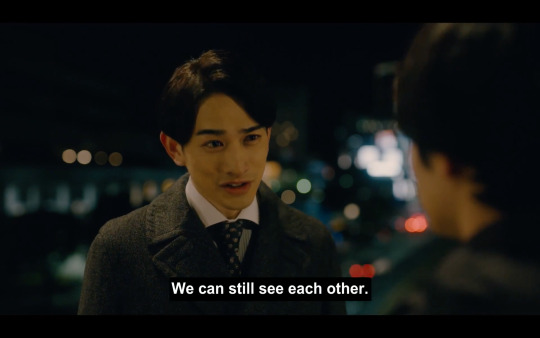
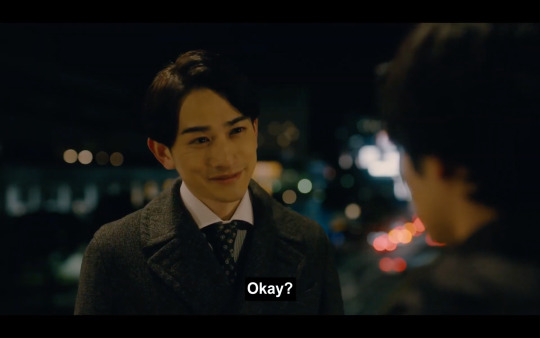
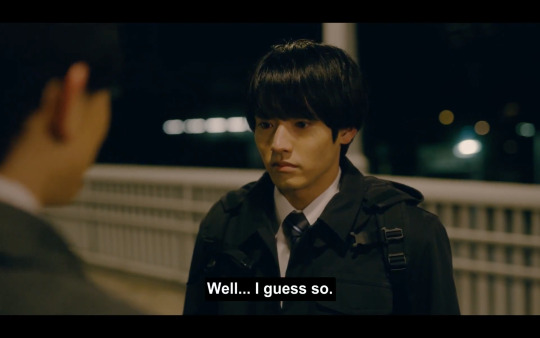
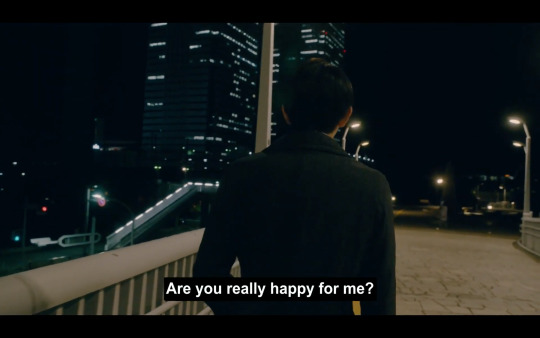
Later in the movie, Adachi gets into an accident in Nagasaki, and Kurosawa rushes to be by Adachi's side. Kurosawa is clearly traumatized. And Kurosawa finally reveals his feelings about the entire situation -- a rare display of direct emotional confession.


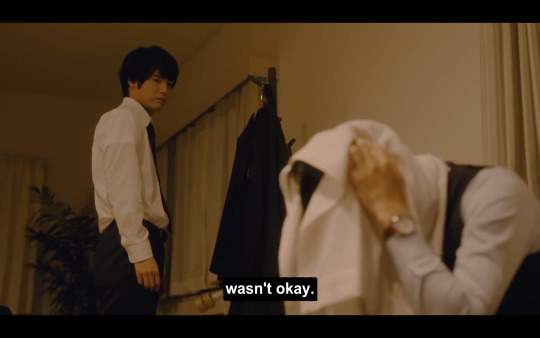
We think that Adachi moved to Nagasaki for this job opportunity -- separating himself from the incredibly devoted and head-over-heels-in-love-with-Adachi Kurosawa. Adachi knows well enough that Kurosawa is suffering in this separation. But later in the movie, after Adachi has moved back with Kurosawa, do we learn Adachi's true intentions. Adachi wants to make himself invaluable at work -- so that Adachi's and Kurosawa's shared company will not separate them if the company finds out about their relationship.
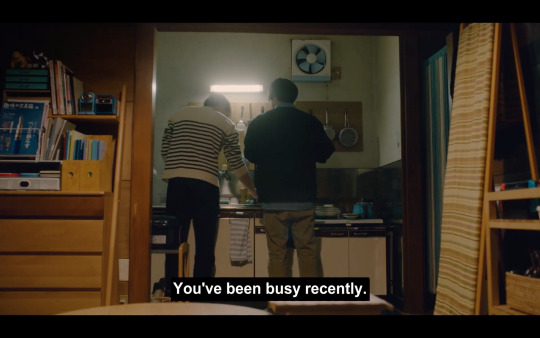

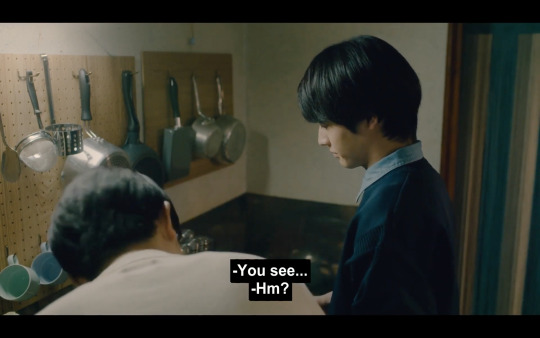
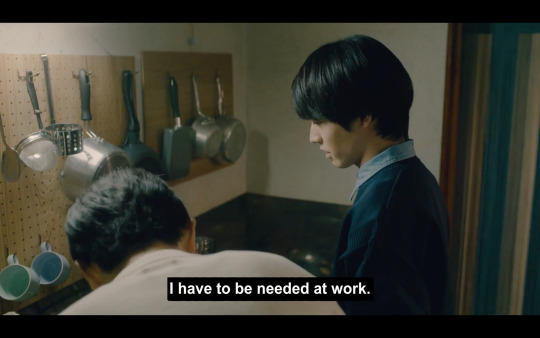

This particular conversation between Adachi and Kurosawa -- after their separation, after they've moved in together -- is a huge turning point in the movie for Adachi, who had usually been the reluctant uke in their relationship prior to this moment. In this conversation, Adachi expresses his fear that outside forces will eventually separate them, and he wants to do what he can to ensure the safety of their relationship.
To me, this is incredibly reminiscent of the compromises Pran and Pat make in Bad Buddy to keep their relationship secret -- another theoretical "separation" -- from their parents for the health, safety, and viability of their relationship.
As well, this conversation between Adachi and Kurosawa moves forward into Adachi's desire to come out to their families. He was inspired by the immediate aftermath of the accident, in which Kurosawa was the last person to find out that Adachi had gotten hurt -- only after Adachi's family and company were notified.
The nuances of this separation between Adachi and Kurosawa -- and what the separation LED TO, which was an eventual and permanent commitment between Adachi and Kurosawa -- are incredibly layered. Adachi made an economic separation from Kurosawa. But it was also rooted in his desire to acclimate his company to his company's dependence on Adachi, so that the company would choose Adachi's contribution to the company over the potentially taboo reality of his same-sex relationship with a colleague in Kurosawa. In other words: he wanted to leverage the separation and his work performance upon his return, to render the company no choice in choosing Adachi's economic performance over his personal and private choices.
(One insight into Japanese culture is that for decades, Japanese corporations have wanted their employees to be married, to complete a seamless connection between household and "office" families. The Japanese BL Kinou Nani Tabeta?/What Did You Eat Yesterday? makes reference to the fact that the main protagonist, Shiro, becomes an independent lawyer because, as a gay man, he may have been pressured to take a wife in another, more group-oriented corporate setting.)
AND, following this, Adachi wanted to come out to his and Kurosawa's families, to also acclimate them to their relationship, so that their families would also not threaten the sanctity and safety of their relationship. And his gamble worked -- and their families accepted them, and they were able to make a permanent commitment to each other.
Without a strategically economic separation, Adachi and Kurosawa could not have achieved key moments of communication that led to their ability to find safety in their external environments, and make a personal and private permanent commitment to each other. The separation to Nagasaki was Adachi's lever to move their relationship forward.
It's so nuanced, so layered, and so strategic on Adachi's end, to use the work separation and his commitment to his company as such a motivator to propel his relationship forward and permanently with Kurosawa -- especially vis à vis the unique nuances of spoken and unspoken communication in Japanese society, which are remarkably different than the styles of communication we see in Thai dramas.
In Pran's and Pat's conclusion in the Thailand of Bad Buddy, they go in the opposite direction: for the sanctity and safety of their relationship, they act out a break-up scenario (with Dissaya telling Pran, "come back to your family," ha), and keep their committed relationship a secret. And this happens *two years* before the context of an actual, physical separation when Pran decides to move to Singapore after graduation.
It's a bit of a switcheroo from what we'd expect by way of open vs. closed communication between Japan and Thailand. But both scenarios, from Cherry Magic to Bad Buddy, work brilliantly well to ensure that all relationships are safe and solidified.
I'm not sure that I can say, globally, that separation from one's nuclear family, or separation from a partner, are common occurrences in manifested everyday reality. As I mentioned before, the economies of many countries are dependent on the physical separation of their citizens to other locales to send back monetary remittances. But more often than not -- when partners are partnered, they tend to want to stay by each other's sides.
I love that many Asian dramas do not shy away from the many realities as to why partners or children may be voluntarily or involuntarily separated from loved ones. Our beloved dramas show us the devastation of involuntary separations, as rendered by Dissaya unto Pran. We see that economic separations can actually LEAD to a solidifying of relationships in the case of Adachi and Kurosawa. We see that family-motivated separations, in the cause of Phupha and Tian, simply needed the investment of time for their relationship to reach a point of comfortable commitment. We see that agency-driven separations by Pharm and Oh-aew can lead to emotional clarity. And, we see that theoretical, secret-kept "separations," of the kind that Pat and Pran created for themselves, to protect their relationship, were risks worth taking, simply for them to be together and happy.
Pain and happiness are not emotions independent of each other. At least in the eyes of my Asian cultures, human beings embody all emotions, all the time. Humans are certainly primed, internally and socially, to seek happiness and balance. But as I've posited here in this post -- is there pleasure without pain? The pain of separation, the trust that partners and family members can learn from each other through separation, and the lessons and communicative ability to solidify relationships after the obstacles of separation, are all themes of life that, I think, are worth unwinding on, in glorious emotional detail. And I love that our beloved Asian dramas do not shy away from these examinations.
(Tagging @dribs-and-drabbles and @solitaryandwandering by request! If you'd like to be tagged, please let me know!)
[Well, this one was a doozy -- if you got through it all, I thank you! Next up, next week, is another post I've been dying to write for months. I had the opportunity to engage in lengthy conversation with a number of FABULOUS Asian Tumblr bloggers, all of us Bad Buddy stans, to reflect on our experiences as Asian reviewers watching BBS and to talk about what we related to. I have a list, a WHOLE LIST! of themes to expound on. I'm calling it Asian Cultural Touchpoints Within Bad Buddy. And I may need to split it into two posts, because there's a lot to talk about. Join me and my friends next week in our continued Bad Buddy brain-rot sesh!
Here is the status of the Old GMMTV Challenge watchlist. Tumblr's web editor loves to jack with this list; please head on over to this link for the very latest updates!
1) The Love of Siam (2007) (movie) (review here)
2) My Bromance (2014) (movie) (review here)
3) Love Sick and Love Sick 2 (2014 and 2015) (review here)
4) Gay OK Bangkok Season 1 (2016) (a non-BL queer series directed by Jojo Tichakorn and written by Aof Noppharnach) (review here)
5) Make It Right (2016) (review here)
6) SOTUS (2016-2017) (review here)
7) Gay OK Bangkok Season 2 (2017) (a non-BL queer series directed by Jojo Tichakorn and written by Aof Noppharnach) (review here)
8) Make It Right 2 (2017) (review here)
9) Together With Me (2017) (review here)
10) SOTUS S/Our Skyy x SOTUS (2017-2018) (review here)
11) Love By Chance (2018) (review here)
12) Kiss Me Again: PeteKao cuts (2018) (no review)
13) He’s Coming To Me (2019) (review here)
14) Dark Blue Kiss (2019) and Our Skyy x Kiss Me Again (2018) (review here)
15) TharnType (2019-2020) (review here)
16) Senior Secret Love: Puppy Honey (OffGun BL cuts) (2016 and 2017) (no review)
17) Theory of Love (2019) (review here)
18) 3 Will Be Free (2019) (a non-BL and an important harbinger of things to come in 2019 and beyond re: Jojo Tichakorn pushing queer content in non-BLs) (review here)
19) Dew the Movie (2019) (review here)
20) Until We Meet Again (2019-2020) (review here) (and notes on my UWMA rewatch here)
21) 2gether (2020) and Still 2gether (2020) (review here)
22) I Told Sunset About You (2020) (review here)
23) YYY (2020, out of chronological order) (review here)
24) Manner of Death (2020-2021) (not a true BL, but a MaxTul queer/gay romance set within a genre-based show that likely influenced Not Me and KinnPorsche) (review here)
25) A Tale of Thousand Stars (2021) (review here)
26) A Tale of Thousand Stars (2021) OGMMTVC Fastest Rewatch Known To Humankind For The Sake Of Rewatching Our Skyy 2 x BBS x ATOTS (re-review here)
27) Lovely Writer (2021) (review here)
28) Last Twilight in Phuket (2021) (the mini-special before IPYTM) (review here)
29) I Promised You the Moon (2021) (review here)
30) Not Me (2021-2022) (review here)
31) Bad Buddy (2021-2022) (thesis here)
32) 55:15 Never Too Late (2021-2022) (not a BL, but a GMMTV drama that features a macro BL storyline about shipper culture and the BL industry) (review here)
33) Bad Buddy (2021-2022) and Our Skyy 2 x BBS x ATOTS (2023) OGMMTVC Rewatch (The BBS OGMMTVC Meta Series is ongoing: preamble here, part 1 here, and more reviews to come)
34) Secret Crush On You (2022) [watching for Cheewin’s trajectory of studying queer joy from Make It Right (high school), to SCOY (college), to Bed Friend (working adults)] (watching)
35) KinnPorsche (2022) (tag here)
36) KinnPorsche (2022) OGMMTVC Fastest Rewatch Known To Humankind For the Sake of Re-Analyzing the KP Cultural Zeitgeist
37) The Eclipse (2022) (tag here)
38) The Eclipse OGMMTVC Rewatch For the Sake of Re-Analyzing an Politics-Focused Show After Not Me
39) GAP (2022-2023) (Thailand’s first GL)
40) My School President (2022-2023) and Our Skyy 2 x My School President (2023)
41) Moonlight Chicken (2023) (tag here)
42) Bed Friend (2023) (tag here)
43) Be My Favorite (2023) (tag here)
44) Wedding Plan (2023)
45) Only Friends (2023) (tag here)]
#bad buddy#bad buddy the series#bad buddy meta#bad buddy the series meta#backaof noppharnach#aof noppharnach#nanon korapat#ohm pawat#ohmnanon#patpran#pran x pat#pat x pran#still 2gether#a tale of thousand stars#atots#our skyy 2 x bad buddy x a tale of thousand stars#cherry magic#cherry magic the movie#until we meet again#i promised you the moon#i told sunset about you#ipytm#itsay#moonlight chicken#the bbs ogmmtvc meta series#turtles catches up with the essential bls#turtles catches up with thai bls#turtles catches up with old gmmtv#the old gmmtv challenge#ogmmtvc
74 notes
·
View notes
Text
hey, sorry um. bad news i called the Kansas Regulatory Board on your boyfriend. yeah, the one who started dating you and is now taking you on a trip to Paris after spending over a year with you for individual treatment and then couples counselling with your ex-husband. i'm then going to personally throw a football at his head for being such a piece of shit therapist. sorry.
#can you tell i have beef with this man#everything about his choices are so wrong on so many levels and his license for practice should be fucking GONE#like if i had 15 hours i could not even BEGIN to tell you all the ways he's being unethical and failing at his job#dr jacob come fight me in a denny's parking lot i fucking DARE you#i see your “ill take my gf on a romantic trip to paris while i leave her son with his father who's trust i have completely betrayed”#and i raise you “meet me on pont neuf at sunset so we can duel to death you curdled cup of milk of a man”#you don't DESERVE to eat crepes in paris#FUCK YOU#hhhhhnnnnng this fictional character has got me in such a rage you don't even understand#it is so hard to live laugh love in these dr jacob conflict episode economies smh#i wish ted a very nice kill him pls :)#ted lasso#ted lasso spoilers#ted lasso season 3#andis thought geyser
203 notes
·
View notes
Text
snippet from my upcoming foxquin fic sinner, sinner (come to dinner) for foxquinweek !!!!!
“Commander Fox,” says the Chancellor, smiling his kindly smile. Fox stands very still and stares straight ahead, past Palpatine and through the great transparisteel window at the city below, skyline exploding in the brilliance of the sun’s final dying rays. The fanciful part of him that will one day be responsible for his death imagines that, if he’s just still enough, Palpatine will forget him entirely. It’s ridiculous, he knows, he knows, of course he knows, but he clings to it anyway, endeavours to move as little as possible, turns trying to hide even the slight rise and fall of his chest into some sort of test of how good his impression of being a block of stone is.
“Sir,” says Fox.
“Commander Fox,” Palpatine says again, still smiling that awful fucking smile, but sadder, now, mournful, bushy eyebrows doing something terrible and expressive. “You have disappointed me.”
“Yes, sir.”
“I gave you a very simple directive, Commander, and still you failed.”
Fox is barely breathing now. Only a few klicks away, the spire of the Jedi Temple burns in a halo of pink-red, spearing through the cloud-strewn sky. It looks like one of the paintings hung in the Senate rotunda corridors, the ones that like as not cost more to procure than he did. His throat is dry. He tries to swallow. It sticks. It is likely he is dehydrated. There is a little light flashing on top of the spire, warning away in-atmo transports and low-flying starships. Orange-blue-green. Orange-blue-green. He stares at it, so he doesn’t have to look at Palpatine.
“Yes, sir.”
“Such inadequacy is, of course, unacceptable, Commander, as I’m sure you’re aware. I really had hoped it would not come to this, you understand.” Liar, Fox thinks. You love this. “But there is only one way to learn, and that is through experiencing consequences of your actions. Perhaps next time you will not take your sworn duty so lightly, hmm?”
“Yes, sir.”
“Draw your blaster, please, Commander.”
Fox blinks and, in his surprise, breaks his stillness to turn his head to face Palpatine properly.
“…Sir?”
“Must I repeat myself twice? Draw your blaster from your holster.” Slowly, Fox draws. He wonders if this is some sort of test, if he’s going to be punished further for making his weapon naked in front of the Supreme Chancellor of the entire fucking Republic.
(In the light of the dusk spilling through the window into the opulent office, Palpatine’s eyes seem almost gold. It is for but a brief moment, just the rays of the fat sun catching oddly, and then they return to that sharp, ice-chip grey like nothing at all happened.)
“Good,” says Palpatine, and smiles again. Like this, he looks like some natborn’s father’s father—grandfather, he believes the term is—all benevolent wrinkles and knowing looks. “Set it to kill.”
Fox sets it to kill. It is not a difficult thing. He is just as much a weapon as the blaster in his hands, well-oiled, clean, smooth. Efficient. He was designed for this. It is easier to follow orders mindlessly; his brain, like all their brains (except, perhaps, Kote’s, but Kote’s a little fucked up and is an outlier for everything else, anyway), is primed for command, made to obey. A perfect, thoughtless gun, with just enough ruthlessness and self-determination to set them apart from the CIS’ droids. That’s the idea, anyway. It certainly wouldn’t be the first time the Kaminoans failed in the execution of something.
“Turn around, Commander,” Palpatine murmurs, words soft and smooth and rich as the heavy velvet-fabric from his home planet that he has all his clothes cut from. “And fire at will.”
rbs deeply appreciated :]
#this is what i was referencing with my cody sunrise fox sunset motif post BTW. if you even care#commander fox#sheev palpatine#foxquin#quinfox#vox#bro idk which is the right tag#wyrm writes#i am SO excited to post this hopefully???? i get it done in time#or the first part done in time at least. bc i have a feeling it will be monstrously long#oranges and sunflower seeds 'verse#technically it is !!!!!!! i think#it assumes the premise for how quinfox meet from one of the other fics im writing for fqw#and that fic is in oranges and sunflower seeds#so like close enough LOL#palpatine#foxquinweek2024#commander cody#but briefly#2024 resolution is to post more of my writing#sw#starwars#the clone wars#tcw#ss(ctd)
65 notes
·
View notes
Text
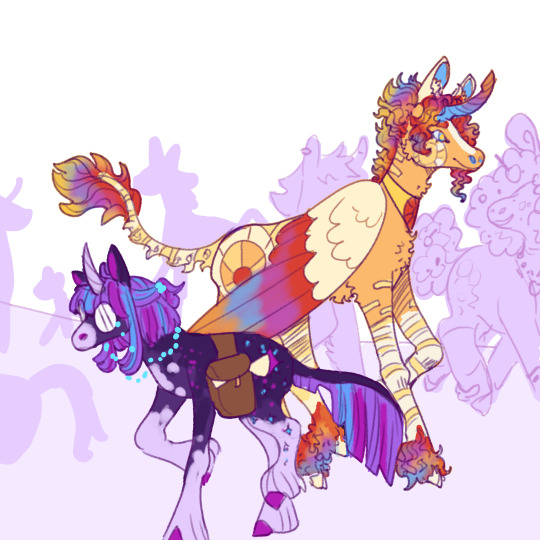
in a different life
#sunset shimmer#twilight sparkle#mlp#mlp g4#mlp redesign#mlp au#mlp fim#mlp art#twilight is an overworked . magic scientist????#living in canterlot#shes friends with sunburst but generally shes by herself#shes very lonely#sunset is either just. the princess of friendship or something else but idk#and they meet one day when sunset goes to like. find a scroll#and immediately gets a crush on the cute assistant carrying like 60 books at once#she likes to tease twilight and twilight gets very flustered
118 notes
·
View notes